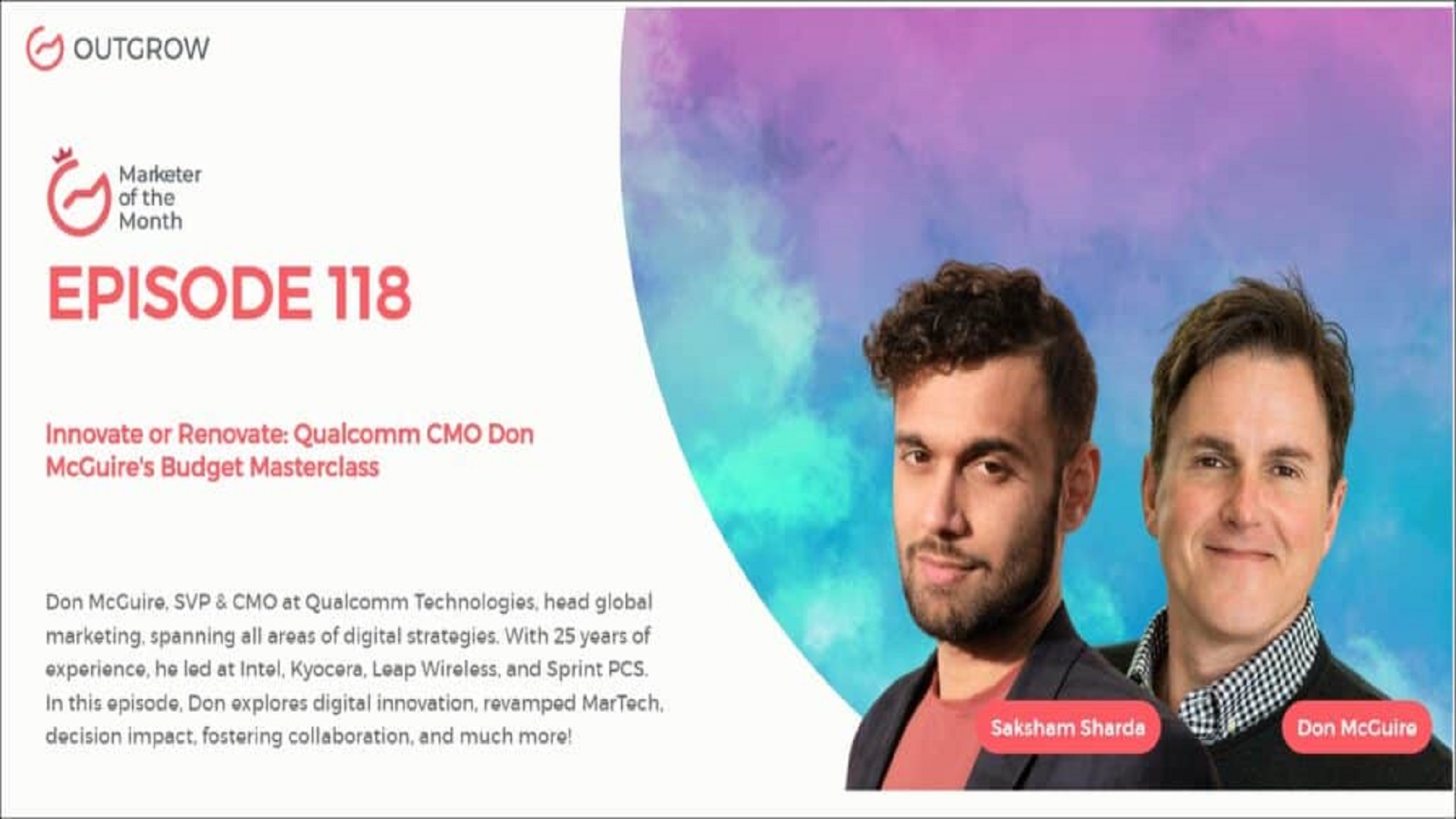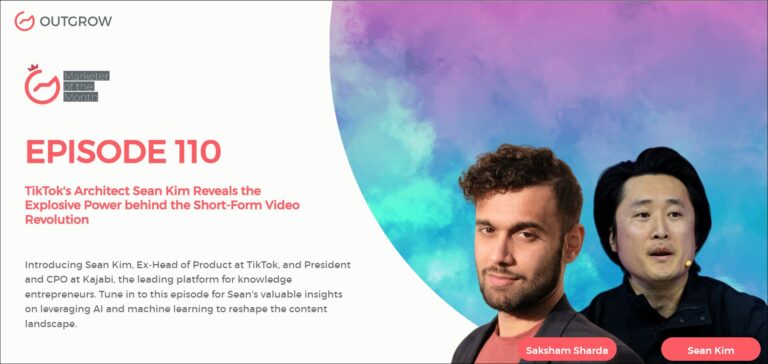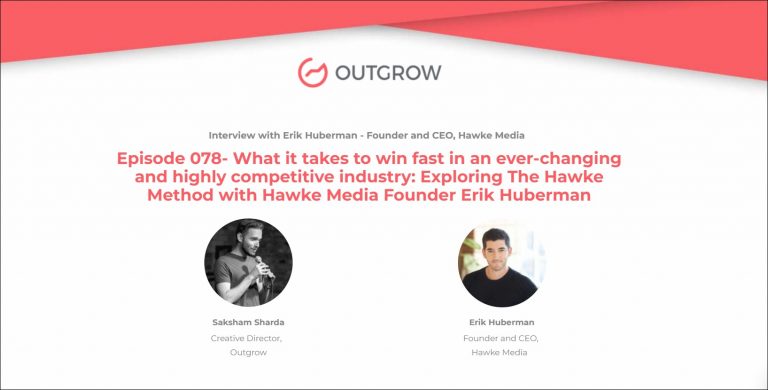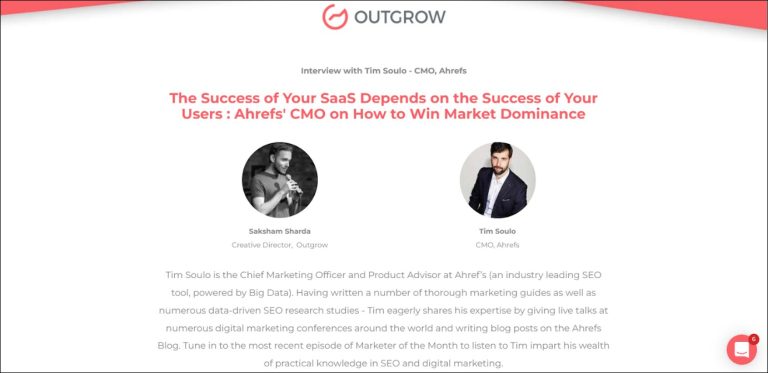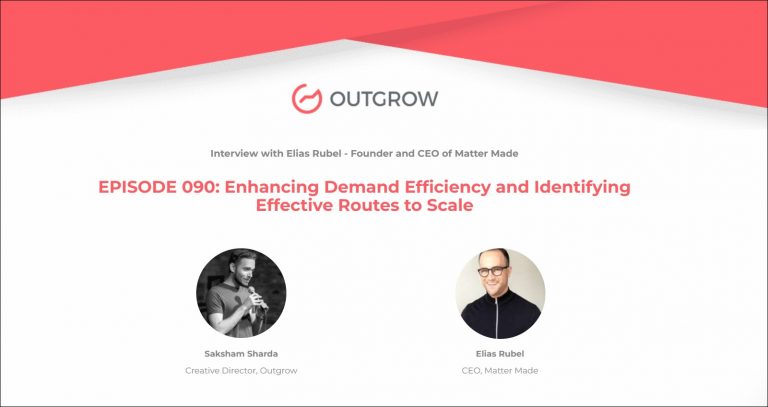Summarize with :
EPISODE 118: Marketer of the Month Podcast with Don McGuire
Table of Contents
Hey there! Welcome to the Marketer Of The Month blog!
We recently interviewed Don McGuire for our monthly podcast – ‘Marketer of the Month’! We had some amazing insightful conversations with Don and here’s what we discussed about –
1. Balancing Innovation and Budget: Leveraging digital toolsets for efficient innovation while managing costs
2. Catching Up in MarTech: Reimagining MarTech to improve the customer journey and meet benchmarks
3. Managing Impact of Difficult Decisions: Addressing delays and considering time to market, competitiveness, and KPIs
4. Overcoming Bureaucracy: Cultivating a collaborative culture at Qualcomm to foster innovation
5. Storytelling and Brand Development: Prioritizing a strong brand story for successful brand execution
6. Strategic Partnerships and Multi-Channel Marketing: Focusing on win-win partnerships and omnichannel approaches to reach diverse audiences effectively
About our host:
Dr. Saksham Sharda is the Chief Information Officer at Outgrow.co. He specializes in data collection, analysis, filtering, and transfer by means of widgets and applets. Interactive, cultural, and trending widgets designed by him have been featured on TrendHunter, Alibaba, ProductHunt, New York Marketing Association, FactoryBerlin, Digimarcon Silicon Valley, and at The European Affiliate Summit.
About our guest:
Don McGuire, SVP & CMO at Qualcomm Technologies, heads global marketing, spanning all areas of digital strategies. With 25 years of experience, he led at Intel, Kyocera, Leap Wireless, and Sprint PCS. In this episode, Don explores digital innovation, revamped MarTech, decision impact, fostering collaboration, and much more!
Innovate or Renovate: Qualcomm CMO Don McGuire’s Budget Masterclass
The Intro!
Saksham Sharda: Hi, everyone. Welcome to another episode of Outgrow’s Marketer of the Month. I’m your host, Dr. Saksham Sharda, and I’m the creative director at Outgrow. co. And for this month we are going to interview Don McGuire, SVP & CMO at Qualcomm Technologies. Thanks for joining us, Don.
Don McGuire: Great to be here. Thank you.
Don’t have time to read? No problem, just watch the Podcast!
Or you can just listen to it on Spotify!
The Rapid Fire Round!
Saksham Sharda: Let’s start with the rapid fire. At what age do you want to retire?
Don Mcguire: 65.
Saksham Sharda: What’s your favorite mobile app?
Don Mcguire: My favorite mobile app would be Dash.
Saksham Sharda: How long does it take you to get ready in the mornings?
Don Mcguire: 25 minutes.
Saksham Sharda: The most embarrassing moment of your life.
Don Mcguire: I wet my pants in the fourth grade.
Saksham Sharda: Mountains or beaches?
Don Mcguire: Beaches.
Saksham Sharda: What’s the most useful mobile feature you can’t live without?
Don Mcguire: Maps.
Saksham Sharda: Favorite color?
Don Mcguire: Black.
Saksham Sharda: What time of day are you most inspired?
Don Mcguire: Evening.
Saksham Sharda: Fill in the blank. An upcoming marketing trend is ______.
Don Mcguire: Web three.
Saksham Sharda: The city in which the Best Kiss of your life happened?
Don Mcguire: The city in which the Best Kiss of my life happened would probably have to be San Francisco.
Saksham Sharda: Pick one Android or Apple.
Don Mcguire: Android.
Saksham Sharda: The biggest mistake of your career?
Don Mcguire: The biggest mistake of my career is trusting my boss.
Saksham Sharda: How do you relax?
Don Mcguire: I am a peloton.
Saksham Sharda: How many cups of coffee do you drink?
Don Mcguire: I don’t drink coffee.
Saksham Sharda: A habit of yours that you hate?
Don Mcguire: The habit of mine that I hate is Twitch.
Saksham Sharda: The most valuable skills you’ve learned in life.
Don Mcguire: Empathy.
Saksham Sharda: Cities or countryside?
Don Mcguire: Cities.
Saksham Sharda: And the last one is your favorite Netflix show?
Don Mcguire: My Favorite Netflix show right now would have to be Last of Us.
The Big Questions!
Saksham Sharda: That’s the end of the rapid-fire round. Now we’ll go on to the long questions. The first one is how you balance the need for innovation with the need to stay within budget and meet revenue targets.
Don Mcguire: That’s a great question. Digital toolsets are both allowing my team to innovate while driving efficiencies and helping us lower overall costs. So that we can do more. So the cost of innovation or the price of innovation should not come at the expense of spending. I think the actual innovation should drive more efficiencies and enable you to do more with what you have.
Saksham Sharda: And where are the areas where you feel in your company that innovation is not doing well as compared to spending?
Don Mcguire: Well, that’s great. We’re catching up in reimagining our Mar tech stack. And, and that’s something that we’ve just invested in, we just announced with Adobe that we are going to be implementing the full Adobe suite of the experience cloud, along with the Creative Cloud. So we’ve been playing catch-up on the MAR tech stack and our digital customer journey has been far behind the benchmark for quite several years. But we are working hard to change that.
Saksham Sharda: Can you set a time when you had to make a difficult decision that impacted the marketing strategy of a product or service? and how did you approach the situation and what was the outcome?
Don Mcguire: Probably that would be deciding to delay the launch of a product after everything was pretty much 100% planned due to an unforeseen circumstance. And we had to then deconstruct all of the impacts that delay would cause both in time to market competitive environments, ability to support that product with marketing, and meeting our targets from both an outbound KPI perspective on driving preference and purchase intent and also ultimately sales.
Saksham Sharda: And how do you approach collaboration for instance, with other departments or stakeholders within a company to ensure success through product launches or campaigns?
Don Mcguire: Early on, getting together early on in the process, proactively listening actively, and then using a lot of whiteboard time. And I’m a very visual person. So we drew a lot of pictures.
Saksham Sharda: And so, as far as collaboration goes in such a huge company that you work for, how do you feel you overcome the bureaucracy if any arises?
Don Mcguire: Well, the interesting thing is at Qualcomm we are part of our DNA from a cultural perspective and is all about collaboration. One of the reasons why we have recently decided to bring everyone back to the office four days a week is because our culture is rooted in collaboration. And to innovate, we feel like you have to collaborate and collaboration works at its best when everybody’s in the room. So that’s one of the things that we pride ourselves on. And we will continue to support that cultural norm, so that we don’t risk, you know, sort of failure from a cultural perspective, which then will impact our ability to create new products and innovate in the long haul.
Saksham Sharda: What is the most essential step for building a go-to-market strategy?
Don Mcguire: I think the most essential step in building a go-to-market strategy is the first P of the four Ps and its products. You have to understand what you’re selling, and the value proposition of that and so that’s the product.
Saksham Sharda: Can you describe a time when you have to adapt to a new market or industry? And how did you approach that challenge?
Don Mcguire: Yes, well, we’ve been diversifying now for the last six to eight years and moving outside of the mobile industry, specifically the smartphone industry into all these new product categories. So it’s been like a Lollapalooza of diversification and growth. One market, a very important market and it’s a high growth market for us is automotive. We have grown exponentially in automotive, the automotive industry requires a different level of engagement. It requires a different type of approach to product development. There are different sets of rules when you’re talking about technology within an automobile environment versus in a smartphone or a PC or other types of products. There are safety concerns, increased safety, and increased privacy, there are different auto-grade types of features that you have to build into your platforms and your products. And so it’s a whole new ballgame. But we’ve successfully moved into automotive to the tune of a $30 billion pipeline that we have currently. So we were able to make the transition over time fairly smartly. But it was a journey and a lot of learning.
Saksham Sharda: So besides automotive, which other industries do you have your fingers in?
Don Mcguire: So we are expanding into the PC market. And we’re going to this a market where we will be a new entrant, for the most part, in a category that has been primarily controlled by a couple of players over the last 25 to 30 years. So this is going to be an uphill climb. And we have to be prepared to have a go-to-market strategy that achieves the requirements of entering that market to drive success. So what’s new, the XR market is another market where we have a lead, but it’s still a nascent market. So as it grows and evolves and becomes more mainstream and commercial, we have to keep pace with that and understand what direction it’s moving in so that we can keep our leadership position. So that’s a different type of story, but a different product category altogether. And then from an IoT perspective, just smart factories, smart cities, moving into different robotics platforms. All of that is something that we have been playing in that we continue to play in, and we see a huge opportunity in the future.
Saksham Sharda: So for a brand to be visible to the right audience, what should come first, brand development or brand messaging?
Don Mcguire: Well as marketers, we are inherently storytellers. And so I think the most important thing that you need to understand and nail down is your story. As far as brand development goes, I think if I understand that correctly, the definition is really about the visual articulation of the brand and the assets that you develop around the brand. I think that has to come secondary to the messaging. So I would say owning that story and understanding your story is paramount to them building out a brand ethos that can drive successful brand development and brand execution.
Saksham Sharda: Since you mentioned you have, you’re getting into a lot of industries, the growth of Partnerships has also accelerated in recent years. So in such a competitive scenario, what should one do to build a good strategic partnership, which is mutually beneficial?
Don Mcguire: Another great question. So we’ve addressed partnerships from two different vectors. First, we have a lot of partners that buy our products, then put them into their products. And I have the unique pleasure of working with some of the world’s most iconic brands, from Louis Vuitton to Cadillac to Samsung, to Lenovo, to Oculus, and now meta quest, etc. And so through those partnerships, we do a lot of CO marketing, a lot of partner marketing, we’re telling our story helps our partner tell their story, especially when it comes to brands, like Louis Vuitton, for example, that’s a luxury blatant brand, but moving into technology, by launching products like smartwatches, and smart speakers, we bring them credibility to that space, they have all the credibility in the world as a luxury brand, but they don’t have credibility as a technology brand. So deploying Snapdragon into their products brings in that credibility. So that’s one area of partnership that’s very important to us. And we do a lot to nurture those relationships so that we can help our customers tell their brand stories. And we also get to tell our brand story. The second type of partnership is partnerships that we’ve engaged in more recently, which is to help align the Snapdragon brand with iconic partners like Manchester United, Mercedes AMG, PETRONAS, and Formula One, two of our big global partnerships that are fairly recent, it was really about how we could form a two-way partnership where we could bring something to them, as well as they could bring something to us. So it’s a little bit different than approaching a sponsorship, in that I don’t have an interest in just throwing my logo on something, I want to have a two-way partnership where our technology can help improve their franchise, and their franchise can help me reach my goals as far as awareness preference or purchase intent for my brand. And so we’ve approached all of our partnerships like that, and this Win Win sort of two-way sort of approach. And it’s worked well. And we’re excited about the work that we’re doing with Manchester United, Mercedes AMG, PETRONAS, and others sort of that are coming down the line anymore in a noisy partnership sphere that is also equally exciting and a non-partnership sphere. We’re doing a lot of it on our own. And one of the things that we embarked upon about two years ago, was building community as part of the marketing mix for Snapdragon. We didn’t know how it was going to go. We knew conversations were going on in social media, around Snapdragon on Reddit, on Twitter, and in different forums. But we didn’t know if we could harness those conversations into more of a community that is sort of out there in the wild. So we launched Snapdragon Insiders, which was our global community about a little less than two years ago. And in little less than two years, we have 8.4 million Snapdragon insiders, globally. It’s a very engaged community. And I’ve been pleasantly surprised as well as just elated that we’ve been able to harness the power of all of these people on social platforms around the world to tell the Snapdragon story to be an advocate for Snapdragon and our partners and their products, to engage with us to give us feedback on how we’re doing and to help grow that brand strength by being these little advocates that are sort of all over the world, telling our story. So it’s been a phenomenal effort and building a community into the marketing mix is something that I had not experienced before my career until now. And so it’s an exciting sort of new adventure.
Saksham Sharda: And what different channels is the community on or is it singular?
Don Mcguire: It’s you know, we approach a community where we have to be where people already are. So the community is live and vibrant on Twitter, Instagram, Discord, tik, Tok, Weibo, Tao, Young, Billy, Billy, and WeChat.
Saksham Sharda: Okay, so in today’s fast-paced world, businesses need to reach those customers where they are. Do you think that multi-channel marketing will be beneficial in helping businesses do this?
Don Mcguire: I think omnichannel approaches to marketing have been around for quite some time. I wouldn’t believe that most brands that have a full marketing mix, and that are present, with their audiences have not adopted an omnichannel approach. I think a singularity approach toward marketing just doesn’t work anymore. The world is fragmented. There are so many messages, and people are constantly bombarded primarily because they live their life through their phones. And there are so many different ways they engage with the world around them, especially the digital world around them, that you have to deploy an omnichannel approach to get the reach and the frequency that you need to hit your KPIs.
Saksham Sharda: All right, so the last question for you is a personal one. What would you be doing in your life, if not this right now?
Don Mcguire: What would I be doing in my life? If not this right now? I think it would be an artist.
Saksham Sharda: What kind of?
Don Mcguire: You know, that’s probably something in the visual arts, not photography or graphic design, but the visual arts.
Let’s Conclude!
Saksham Sharda: Thanks, everyone for joining us for this month’s episode of Outgrow’s Marketer of the Month. That was Don McGuire, SVP & CMO at Qualcomm Technologies. Thanks for joining us, Don.
Don McGuire: Pleasure. Thanks for having me.
Saksham Sharda: Check out the website for more details and we’ll see you once again next month with another marketer of the month.

